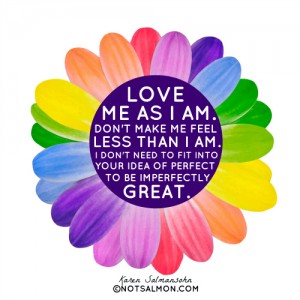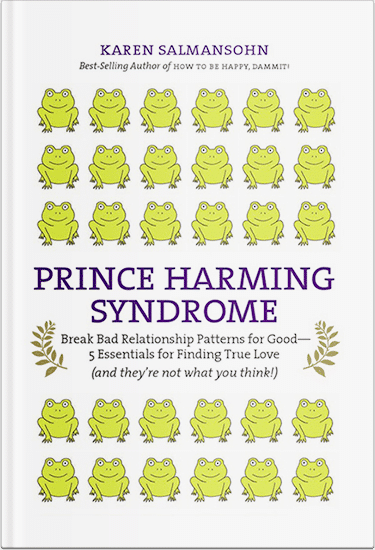
Lots of people encourage their love partners to change – or to do things differently. Do you know the difference between “Bad Compromise”vs. “Good Compromise”? Read on so you know the signs of a toxic love relationship.
About a decade ago, I dated a guy who every time his name was mentioned, inspired my girlfriends to sing the theme song to Batman.
Not because this man looked great in black Spandex tights. No, no. It was because he was a bad man.
“Dadadadadadada Bad-man! Bad-man!” my girlfriends would sing, right after I’d finish telling a particularly bad Bad-man episode—of which there were many.
What made him a Dadadadadadada Bad-man?
I’ll call him Bruce Wayne to protect his not-so-innocent secret identity.
Bruce Wayne didn’t want me to attend my favorite morning yoga classes. He explained he did not want anything—other than himself—to bring me morning pleasure. So I stopped going (to make him happy and relaxed) and began drinking red wine (which made me happy and relaxed instead).
 I remember when I first confessed this “compromise” to my girlfriends, I did so as a joke. I said, “Can’t make it to your favorite morning yoga classes?” while holding up a glass of Cabernet. “Try yoga in a glass! Same relaxing effects, only faster, more convenient and it won’t upset boyfriends.”
I remember when I first confessed this “compromise” to my girlfriends, I did so as a joke. I said, “Can’t make it to your favorite morning yoga classes?” while holding up a glass of Cabernet. “Try yoga in a glass! Same relaxing effects, only faster, more convenient and it won’t upset boyfriends.”
My girlfriends would all shake their heads in disapproval. “I can’t believe you’re giving up your beloved Jivamukti!”
Next up was Bruce Wayne’s request for a wardrobe change.
“I prefer you stop dressing in anything sexy,” Bruce Wayne scolded. “It makes me think you’re interested in meeting other men.”
For the record: I wasn’t.
I like to dress sexy to feel sexy for me and my man. Kaput.
But while dating Bruce Wayne, I entered into what I refer to as “My Amish Girl Period.”
Basically, turtlenecks became a staple throughout all four seasons.
Next were Bruce Wayne’s objections to my hair. At that time, I had a wild, shoulder-length, thick and manic mane of wavy hair which everyone complimented – except Bruce Wayne.
He seemed to have a Samson-and-Delilah reaction to this mane o’ mine.
I intuit he felt my hair gave me too much power over men. Somehow Bruce Wayne convinced me to cut my hair to a non-threatening earlobe length.
“If you ask me,” one girlfriend told me. “You’re not involved in a relationship. It’s a hazing experience.”
When I look back now on this relationship, it’s clear how Bruce Wayne is a good example of a man who asks for “bad compromise.” The kind of compromise which demands compromising your soul and your authentic self.
Looking back I’m surprised how this old me (who I suppose is really the young me) would bend so radically to please a guy – even giving up bending myself into my favorite yogi poses.
Happily, the new me (who I suppose is the old me) knows better. The new old me can clearly see how there’s a huge difference between “bad compromise” and “good compromise” in a relationship.
What creates the difference between good compromise and bad compromise?
- A “bad compromise” is changing your habits and self in such a way that you wind up becoming less of your full, authentic, thriving self.
- A “good compromise” is changing your habits and self in such a way that you grow more into your most full, authentic, best self.
My favorite philosopher buddy Aristotle explains that the reason why so many people are unhappy in life is because they choose mates simply for “pleasure” or “utility.”
These particular mates are only sex-mates, ego-mates and/or wallet-mates.
Real-deal love happiness, according to Aristotle, comes from being involved in “a relationship of shared virtue,” where you pick a mate who gets you at your core self – or “soul self” – and lovingly inspires, challenges and supports you to become your best possible soul self.
“A relationship of shared virtue,” therefore, is when you and your partner both welcome putting up with the temporary pain of personal change for the greater gain of personal growth.
Or what Aristotle calls “the education of the soul.”
 According to Aristotle, this “education of the soul” (what can be defined as “the pursuit of personal growth” ) definitely worth developing because every time you put forth the effort to stretch and strengthen your soul, you increase your overall happiness.
According to Aristotle, this “education of the soul” (what can be defined as “the pursuit of personal growth” ) definitely worth developing because every time you put forth the effort to stretch and strengthen your soul, you increase your overall happiness.
Basically, Aristotle believed that true happiness comes from surrounding yourself with people, habits and experiences which help you grow into your best possible self.
With all this in mind, putting in the work of “good compromise” is a positive way to ensure you’re stretching and strengthening your soul so you can grow into your best possible self – thereby increasing your overall happiness.
What is a good compromise?
Here are some examples in action:
- When one partner requests the other to attempt to be a little neater or more organized.
- If one partner requests the other to take better care of their health and fitness.
- When one partner requests the other try to be a more direct communicator and to speak up more often.
- If one partner requests the other to speak less and listen more.
Or, to sum up “good compromise” in a highly memorable movie line, it’s when Jack Nicholson’s character in As Good As It Gets says to Helen Hunt’s character…
“You make me want to be a better man.”
Are you right now wondering whether a specific compromise request is a good compromise or bad compromise?
If so, I want you take some time to quiet your mind and meditate on this question. Breathe in love, breathe out fear. Breathe in growth, breathe out stagnation.
Now ask yourself the following two questions:
- Will this compromise request lead to someone compromising their authentic self—their purpose for being here and their spirit’s fiery flame of passion? Is this compromise request trying to add far too much “obey” into that “love, honor and obey” relationship formula? If so, this is a bad compromise.
- Plus, will this compromise request help empower someone’s authentic self in order to boost them to become a better man or woman (as Jack Nicholson’s character so succinctly put it)? If so, this is a good compromise.
Thankfully, the old me is now happily involved in a “relationship of shared virtue” – which only involves good compromise. So, if you haven’t seen me in my favorite morning yoga class lately, please know that I only have myself to blame!
Good news: The new old me is now getting older and wiser.
Bad news: The new old me is getting older and wider as well!
P.S. Before you zip off to your next Internet pit stop, check out these 2 game changers below - that could dramatically upscale your life.
1. Check Out My Book On Enjoying A Well-Lived Life: It’s called "Your To Die For Life: How to Maximize Joy and Minimize Regret Before Your Time Runs Out." Think of it as your life’s manual to cranking up the volume on joy, meaning, and connection. Learn more here.
2. Life Review Therapy - What if you could get a clear picture of where you are versus where you want to be, and find out exactly why you’re not there yet? That’s what Life Review Therapy is all about.. If you’re serious about transforming your life, let’s talk. Learn more HERE.
Think happier. Think calmer.
Think about subscribing for free weekly tools here.
No SPAM, ever! Read the Privacy Policy for more information.
One last step!
Please go to your inbox and click the confirmation link we just emailed you so you can start to get your free weekly NotSalmon Happiness Tools! Plus, you’ll immediately receive a chunklette of Karen’s bestselling Bounce Back Book!



 I remember when I first confessed this “compromise” to my girlfriends, I did so as a joke. I said, “Can’t make it to your favorite morning yoga classes?” while holding up a glass of Cabernet. “Try yoga in a glass! Same relaxing effects, only faster, more convenient and it won’t upset boyfriends.”
I remember when I first confessed this “compromise” to my girlfriends, I did so as a joke. I said, “Can’t make it to your favorite morning yoga classes?” while holding up a glass of Cabernet. “Try yoga in a glass! Same relaxing effects, only faster, more convenient and it won’t upset boyfriends.” According to Aristotle, this “education of the soul” (what can be defined as “the pursuit of personal growth” ) definitely worth developing because every time you put forth the effort to stretch and strengthen your soul, you increase your overall happiness.
According to Aristotle, this “education of the soul” (what can be defined as “the pursuit of personal growth” ) definitely worth developing because every time you put forth the effort to stretch and strengthen your soul, you increase your overall happiness.
